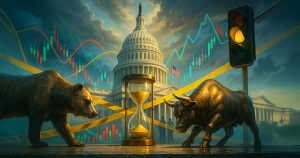All individuals and financial institutions need to be looking into crypto according to Changpeng Zhao (CZ), the CEO of cryptocurrency exchange Binance. He says that not educating yourself on it is “irresponsible”.
CZ, the billionaire CEO of Binance, the biggest crypto exchange in the world by trading volume, aired his views on crypto in an interview with Bloomberg today.
When asked about the kind of conversations his company was having with regulators he replied that various jurisdictions were approaching the question differently.
He said that he thought China was very open to blockchain technology and that it was developing its own digital currency, but that “in typical Chinese fashion”, it was blocking out all competition.
He thinks that the US is probably the most advanced for crypto regulations, given that some crypto exchanges (Coinbase etc.) are getting listed on the NASDAQ.
Singapore was the other jurisdiction he mentioned, and he thought the country was quite progressive, welcoming to innovation, but also very tough.
Asked when he thought crypto would go “mainstream”, CZ replied that it was all about adoption. His reckoning was that this was at around 5% currently. Although he thought that was significant, around 50% was his figure for mass adoption, and that this should happen over the next 10 years.
Talking about the supposedly negative effect of Bitcoin volatility, CZ explained that it was a very new asset and that if you compared it in relative terms to the US dollar, then that was also volatile.
According to the exchange boss, CBDCs (central bank digital currencies) were not a threat to crypto. He said that given that they were also a blockchain technology, they gave validity to the cryptocurrency space because governments would be obliged to educate the people on them – and therefore also on cryptocurrencies.
The key developments that CZ sees in the crypto sector are that use cases are becoming more advanced. He mentioned DeFi and NFTs and how they were providing unique services. He talked about decentralised social networks and how fan tokens provided a way to monetise them.
Disclaimer: This article is provided for informational purposes only. It is not offered or intended to be used as legal, tax, investment, financial, or other advice.





















